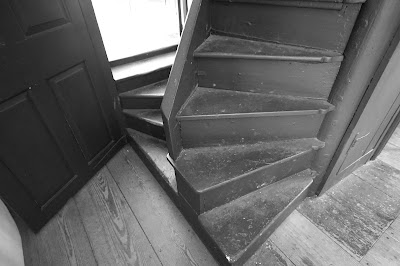I had a summer that didn't use much of my mind, so then I lost words. And my body, too, began to dwindle, only I gained weight in the process.
So when Jessica Lowenthal invited me to the reception honoring Julia Bloch, the new director of Creative Writing at Penn, I had many concerns. One: my wrong hair. Two: my wrong shoes. Also (like I told Jay Kirk and then Greg Djanikian and maybe even Tom Devaney and Avery Rome and Stephen Fried, but not my students Nina and David, or maybe I did, because I don't know, I was feeling irresponsible, and did I tell Al Filreis, too?, but I know I did not so burden Jamie-Lee Josselyn, Lorene Carey, Max or Sam Apple, at least I hope not), I had lost my personality. Left it somewhere. In the summer.
(Perhaps that's a good thing?)
But I went anyway, talking to my son by phone while in transit so that I would not turn back because, as I have noted, everything about me was not quite right, and if I'd not been talking with him, I'd have talked myself back onto the train and headed reverse west, for home.
Then I crossed the threshold at Kelly Writers House (there's always a little thrill involved) and everything changed. The place was just, well, filling up. With faculty members I respect and love, and students I adore. Soon (or, it actually happened first) Jessica herself was taking me on a tour of the new Wexler studio, and bam. I didn't look right, but something happened. I felt as if I belonged.
Then the star of our evening, the star of our program, stepped forward and faced a crowded, beaming room and began to read poems from
Valley Fever (Sidebrow Books) and
Hollywood Forever (Little Red Leaves Journal & Press, the Textile Series) and I, sitting there in the front row, began to feel a hot little prickle inside my head. Like the blank nothing of my thoughts was getting Braille-machine punched by all the delicious oddness of Julia's phrasing and syntax, occasionally repurposed lines, jokes I got and maybe didn't always entirely get (because, as I always say and forever mean, I am just not that smart). Julia was talking and then (I heard this) she was singing, but without any change in the pitch of her voice. Singing by exuding whole phrases in one long breath, then stopping (beat/beat) and starting again. It was like being driven in a car with the windows down, at night, when there is a lot of open road but also some bright red traffic lights.
Damn, I thought.
What do I mean, how can I explain this? These coupled and uncoupled ideas, the surreality of words you assume have been fashioned from parts, the winnowed down ideas that, when toppled and stacked, say something.
Mean something. Even if you can't actually always articulate what you have been stung by, you know you have been stung.
Here is half of "Wolverine," from
Valley Fever, a poem I instinctively love, also a poem I will ponder for quite some time.
Wolverine
I was only pretending
to be epiphanic
she said, tossing the whole
day over the embankment.
Is the heart collandered
or semiprecious
filled with holes
and therefore filled with light —
....
This afternoon, following a morning of work and a conversation with a friend, I read Julia's two books through, cover to cover. I hovered. I felt that warm thing happen again in my head, that invitation I will, as a writer and reader, always accept—to slam and scram the words around, to make the heart inside the brain beat again.
Thank you, Julia, for making my brain heart beat again.
And. You are going to be terrific. You already are.
Read more...









































